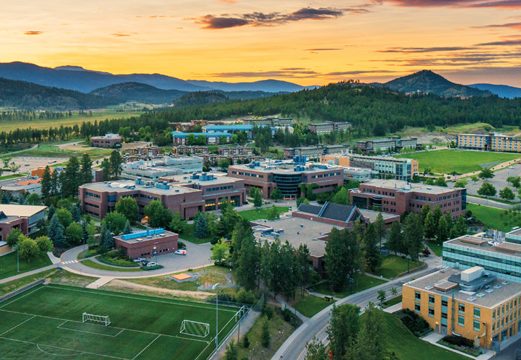Prepare yourself for a career in inland aquatic ecosystems. As a Freshwater Science student, you'll study water quality, hydrology, water resources, aquatic organisms, and the health of aquatic ecosystems.
Program information
Send details- Campus: Okanagan
- Faculty: Irving K. Barber Faculty of Science
- Degree: Bachelor of Science
- Length 4 yrs
- Co-op Yes
- Honours Yes
Freshwater Science integrates aspects of biology, chemistry, geography, and earth and environmental sciences to understand inland aquatic systems. Designed to give you a broad perspective on inland waters, this program takes a highly interdisciplinary approach to explore the science behind emerging environmental issues facing our society. Key issues include land use and water interactions, toxicants in the aquatic environment, and the potential effects of global climate change on aquatic environments and water resources.
As a Bachelor of Science student on UBC’s Okanagan campus, you can choose a major or honours in Freshwater Science.
Experiential learning and research
Your coursework will be enhanced with field trips and opportunities to get out into the Okanagan’s great outdoors. In your third or fourth year of study, you’ll have the option of completing directed studies and conducting independent readings and research.
If you choose the honours option, you’ll undertake an independent research project under the supervision of a faculty member. The Irving K. Barber Faculty of Science holds an annual undergraduate research conference on UBC’s Okanagan campus to showcase student research projects.
Campus features
The Department of Earth, Environmental and Geographic Sciences is home to a wide range of research facilities:
- Fipke Laboratory for Trace Element Research (FiLTER), a multi-million dollar, state-of-the-art facility with equipment for major and trace element analysis and electron microbeam imaging
- Okanagan Institute for Biodiversity, Resilience, and Ecosystem Services (BRAES), a collaborative research institute working in ecology, biodiversity and conservation, water conservation and quality, and environmental sustainability
In addition, individual faculty members have active research programs backed by modern laboratory facilities, including the Complex Environmental Systems Lab, the GIS Lab for Spatial Data Analysis, and the PALEO Lab.
Send detailsLife at UBC's Okanagan campus
UBC's Okanagan campus is renowned for its research opportunities and access to professors. On a tight-knit campus like the Okanagan’s, you’ll be able to work closely with award-winning faculty and make meaningful connections with your peers. Join a club such as the Freshwater Science Course Union and connect with your fellow peers.
Find out moreYour future
You’ll graduate with the skills and knowledge necessary to deal with future national and international freshwater environmental problems concerning water quality and quantity. As a Freshwater Science graduate, you could work as a water quality specialist, a hydrologist, a water stewardship officer, or an aquatic ecologist.
Program graduates
- Regional Hydrogeologist, Ministry of Forests, Lands, Natural Resource Operations and Rural Development
- Environmental Consultant, Indigenous and Northern Affairs Canada
- Senior Aquatic Ecologist, Ministry of Forests, Lands, Natural Resource Operations and Rural Development
- Water Stewardship Director, Okanagan Basin Water Board
Program requirements
English-language requirements
English is the language of instruction at UBC. All prospective students must demonstrate English-language competency prior to admission. There are numerous ways to meet the English Language Admission Standard.
General admission requirements
IB Diploma Programme
- Completed IB Diploma, including at least three Higher Level courses.
IB Certificate Courses
- IB Certificate courses (Standard and Higher Level) may be used in an admissions average if you are graduating from a recognized high school curriculum that can be used as your basis of admission.
- IB Math Applications and Interpretations SL, or IB Math Studies, do not satisfy the math requirement for admission to UBC’s science-based programs, the Faculty of Management, the UBC Sauder School of Business, or the Vancouver School of Economics.
Degree-specific requirements: Science
- IB Math Analysis and Approaches SL or HL, or IB Math Applications and Interpretations HL (IB Math Applications and Interpretations SL, or IB Math Studies, are not acceptable)
- One of IB Biology, IB Chemistry, or IB Physics
- Grade 11 or equivalent Chemistry
- Grade 11 or equivalent Physics is strongly recommended
Note: Grade 11 Chemistry and Physics requirements listed are only relevant to students who are not completing the equivalent IB Diploma Chemistry and/or Physics courses.
For students studying outside of Canada, some examples of courses that may be accepted as Grade 11 equivalents are junior-level courses for American students, and IGCSE and O Level for those following British-patterned curricula.
Related courses
The following subject categories are particularly relevant for this degree. Consider taking courses in these areas in your junior year and senior year.
- Language Arts
- Mathematics and Computation
- Sciences
